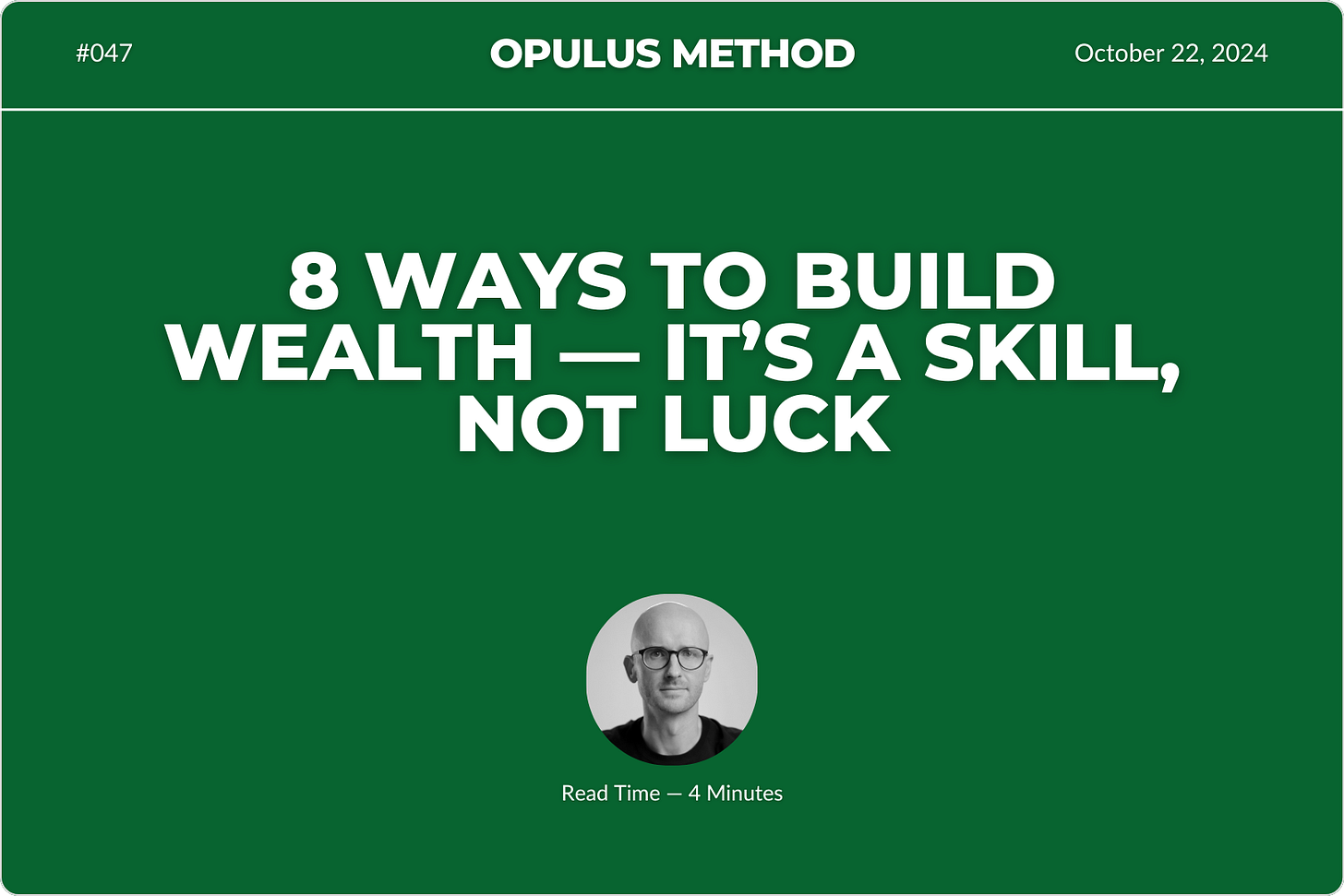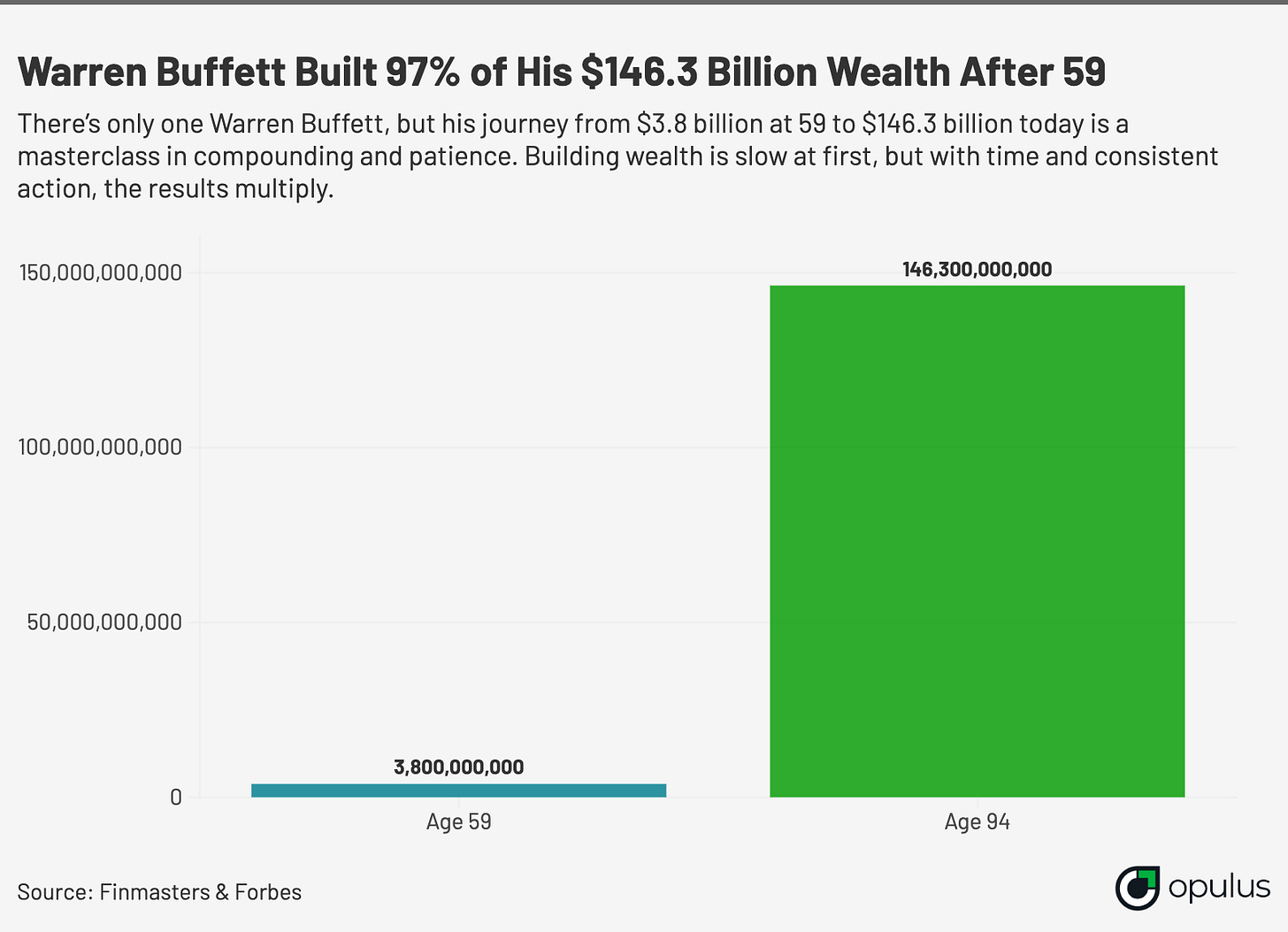8 Ways to Build Wealth—It's a Skill, Not Luck
Naval Ravikant's Actionable Strategies for Millennials Seeking Financial Freedom.
Wealth isn't a matter of chance—it's a skill you can master with the right mindset and tools.
Think it's just for the lucky few? Think again.
It's about developing skills, using leverage, and creating systems that allow your money to work for you.
These aren’t just theories—this is the same approach I’ve seen work for some of our wealthiest clients.
Naval Ravikant, a Silicon Valley entrepreneur and angel investor in companies like Twitter, Uber, and Postmates, has distilled wealth-building into a set of principles anyone can follow.
Today, I’m going to share 8 key lessons inspired by Naval's teachings. These are practical, actionable steps you can take today to start building wealth on your own terms.
Let’s get into it ↓
1. Seek Wealth, Not Money or Status
Wealth isn't about having the biggest bank account or a fancy title.
Wealth is owning assets that generate income while you sleep—businesses, real estate, or investments. Money is just the tool we use to transfer wealth, and status is a social construct.
Focus on building real wealth because it's what will give you freedom, not just a bigger paycheck.
Action step: Start by looking at what you currently own. Are your assets working for you? If not, it’s time to start acquiring assets that grow over time, like stocks, real estate, or a business.
“Wealth is having assets that earn while you sleep. Money is how we transfer time and wealth. Status is your place in the social hierarchy.”
— Naval Ravikant
2. You Won't Get Rich Renting Out Your Time—Own Equity Instead
Trading hours for dollars? You're capping your earning potential.
There are only 24 hours in a day. To break free, you need to own equity in something scalable—a business, real estate, or stocks. Equity is what grows while you're sleeping.
Action step: Identify one area where you can start building equity this month. Is it starting a side business or obtaining equity in a company?
“You’re not going to get rich renting out your time. You must own equity—a piece of a business—to gain your financial freedom.”
— Naval Ravikant
3. Play Long-Term Games with Long-Term People
Quick wins are tempting, but real wealth comes from compounding—whether that's in your investments, relationships, or knowledge.
Surround yourself with people who are committed to the long game and who share your values. Over time, these relationships will amplify your results.
Action step: Identify the top three long-term thinkers in your life. Schedule time with one of them this week to discuss wealth-building strategies. Learn, apply, repeat.
“When you find the right thing to do and the right people to work with, invest deeply and stick with it for decades.”
— Naval Ravikant
4. Use Leverage to Multiply Your Impact
Leverage is the secret weapon of the wealthy. There are three types:
Labor (people working for you)
Capital (money working for you)
Products (things that scale with no extra cost—media, software, code, productize yourself)
If you want to get rich, you need to learn how to apply leverage to scale your impact.
Here’s a few real-world examples:
Labor leverage: Hiring a virtual assistant to handle administrative tasks, freeing you up for high-value work.
Capital leverage: Investing in a growing company's stock, allowing your money to work for you as the company expands.
Product leverage: Creating an online course that teaches your expertise, which can be sold repeatedly without additional effort.
Action step: Identify one area where you can apply leverage this month. Is it hiring help, investing capital, or creating a scalable product?
“Leverage comes from capital, people, or products with no marginal cost of replication—like code or media. Leverage is what separates great fortunes from mere hard work.”
— Naval Ravikant
5. Embrace Accountability and Get Paid for Your Judgment
Taking on accountability can feel risky, but it’s also where the real rewards lie.
When you take ownership of outcomes, you get the chance to prove your value. Over time, the market will pay for your judgment, not just your time.
This is why being accountable is so critical—it puts you in a position where your decision-making ability becomes your most valuable asset.
Action step: Identify one area in your work or business where you can take on more accountability. The more accountable you are, the more trust and reward you’ll earn.
“Embrace accountability and take business risks under your own name. Society will reward you with responsibility, equity, and leverage.”
— Naval Ravikant
6. Specific Knowledge is Your Superpower
What's your unique skill that others can't easily replicate?
That's your specific knowledge—your superpower. It's usually something that feels like play to you but looks like work to others. This is where you can add the most value.
Action step: List three things you're exceptionally good at. How can you monetize these skills at scale?
“Specific knowledge is knowledge that you cannot be trained for. If society can train you, it can replace you.”
— Naval Ravikant
7. Avoid Status Games
Are you more focused on how you're perceived than what you create?
That's a status game, and it's a trap. Don't waste time trying to impress others. Instead, focus on creating value—whether that's through building a product, a business, or an investment.
Action step: Reflect on your recent decisions. Were any driven by status rather than value creation? How can you shift your focus?
The problem with status games is that they are always comparative. You can’t win, because there will always be someone higher.
— Naval Ravikant
8. Be Patient
Building wealth takes time.
Think of it as compounding interest in all areas of life—finances, relationships, knowledge.
The key?
Be patient and let compounding work its magic. Whether you're investing money or time into building skills, playing the long game always wins.
Action step: Set a long-term goal (5+ years). What small, consistent action can you take daily to build your wealth?
“Most of the gains in life come from suffering in the short term so you can get paid in the long term.”
— Naval Ravikant
Embracing Risk and Learning from Setbacks
Look, I get it. Taking steps to build wealth can feel risky.
What if you fail?
Here's the truth: you will face setbacks. I have, and so has every successful person I know.
But here's the key: view these setbacks as learning opportunities. Each 'failure' is just data that helps you refine your approach.
Remember, the biggest risk is not taking any risk at all.
Time to Execute
Building wealth isn't reserved for the lucky few—it's a skill you can develop by following these principles.
The key?
Start taking small actions today and stay committed to the process.
So, which strategy are you going to tackle first?
Seek wealth, not money or status
Own equity instead of renting out your time
Play long-term games with long-term people
Use leverage to multiply your impact
Embrace accountability
Develop your specific knowledge
Avoid status games
Practice patience and consistency
Your future self will thank you for the small actions you take today.
Questions? Reach out—I'm here to help you earn your financial freedom.
Thanks for reading. We’ll see you next week.
Whenever you're ready, there are 2 other ways we can help you:
Opulus Method Digital Course: Join 350+ students inside the Opulus Method. In just 90 minutes, learn a proven system to secure your financial freedom without sacrificing your lifestyle.
Join Opulus as a Client: We'll build your personalized strategy to reduce taxes, boost your income, and grow your wealth. Live life on your terms—we'll execute the financial strategy to get you there.
Opulus, LLC (“Opulus”) is a registered investment advisor in Pennsylvania and other jurisdictions where exempted. Registration as an investment advisor does not imply any specific level of skill or training.
The content of this newsletter is for informational purposes only and does not constitute financial, tax, legal, or accounting advice. It is not an offer or solicitation to buy or sell any securities or investments, nor does it endorse any specific company, security, or investment strategy. Readers should not rely on this content as the sole basis for any investment or financial decisions.
Past performance is not indicative of future results. Investing involves risks, including the potential loss of principal. There is no guarantee that any investment strategies discussed will result in profits or avoid losses.
All information is provided "as-is" without any warranties, express or implied. Opulus does not warrant the accuracy, completeness, or reliability of the information presented. Opinions expressed are those of the authors, Ryan Greiser and Francis Walsh, and are subject to change without notice.
Opulus is not responsible for any errors or omissions, nor for any direct, indirect, or consequential damages resulting from the use or reliance on this information. Use of the content is at your own risk. This content is not intended as an offer or solicitation in any jurisdiction where such an offer or solicitation would be illegal.








